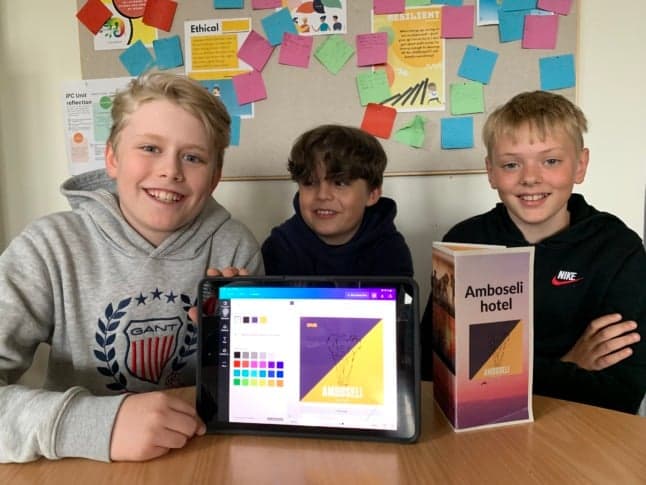The Swedish school where children are creating their own futures with digital tech
Keeping up with the latest trends in digital tech can seem an impossible task. But for one group the constant flow of new products, features and releases is simply the norm: children.

So, how is this reality changing schooling today? The Local learns how one leading network of schools and pre-schools in Stockholm is using technology to unleash “student-driven learning” – where children thrive by following their personal passions and have less fear of making mistakes.
The tools of the trade: from pencils to Chromebooks
The new technologies in today’s classrooms may not appear to have much in common with the humble pencil. But both offer great opportunities for children to learn and feel inspired, says Lindsey Andersson, the Canadian-born ICT coordinator at Futuraskolan International.
Suspicions that digital tools distract schoolchildren from learning the basics are mistaken, she says.
“The pencil is a fantastic tool but how many people use it to its full potential? You can hand write, shade, outline, sketch, draw, blend, count, build or even use it to put your hair up,” says Andersson. “Likewise, digital devices aren’t just for watching YouTube or playing video games. They’re also tools with fantastic potential.”
The Futuraskolan network includes 14 pre-schools and schools in Greater Stockholm for children aged up to 15. Lessons are carried out in English and Swedish.
Preschool children are introduced to everything from iPads to virtual reality glasses and robots. Children in the early school grades also regularly use iPads, typically moving on to Chromebooks in around grade seven.
“Most students feel it’s easier to be creative with Chromebooks as they get older,” says Andersson. While the schools still have projectors, most now use Apple TVs and Chromecast, she adds, and many have invested in 3D printers.
Freedom not fear: learning through play
Digital tools help remove a fear of making mistakes that can otherwise be stifling, says Niki Christofi, who teaches grade four children at Futuraskolan International Rådan in Sollentuna. She says children working on paper often feel one mistake would ruin their work.
 Photo: Futuraskolan
Photo: Futuraskolan“Now, mistakes can be erased by just pressing undo,” says Christofi, who is of Portuguese and Cypriot heritage. The result? Children feel more freedom to experiment, leading them to discover skills and knowledge they may otherwise have missed out on. “ICT allows children to use their full creativity and potential,” says Christofi.
Digital devices also mean children can learn in the way they find easiest. “Some children want to read to comprehend, others prefer to listen,” she adds. “With iPads, they have these options.”
It’s also simple and fast for Futuraskolan’s teachers to get permission to introduce apps into the classroom. While children in previous generations may have had no idea what a graphic designer does, those at Futuraskolan use the design app Canva to create posters, brochures, and more.
The app also allows those who are more confident to create from a blank page and others to use templates as a starting point. “Children in Grade 3 used it to make postcards to sell for our big fundraising day for our Global Citizenship project,” says Andersson. “They took nature photographs and edited the photos using the app.”
Children also love the Algodoo science app, says Christofi. It allows you to design experiments such as testing whether balls of the same size but different materials will sink or float. “One flies because it’s made of helium,” she says. “Then they want to know ‘why does this gas go up?’”
Andersson agrees that digital technology is playing a vital role in supporting personal development. “When you learn through play, you don’t realise you’re learning,” she says. “Children get to practice skills like spelling, writing, language, maths, and music.”
Introducing iPads to the classroom has had radical benefits for students with learning disabilities, dyslexia, or problems with hand-eye coordination, according to Andersson. “They speak their sentence and the iPad magically writes it for them; suddenly they’re just as good at handwriting as their peers!”
 Lindsey Andersson and Niki Christofi. Photo: Futuraskolan
Lindsey Andersson and Niki Christofi. Photo: FuturaskolanTomorrow’s world: how passion feeds purpose
Schools should fully embrace new technologies “to keep up with the cultural revolution we’re experiencing in the digital age,” believes Tom Callahan, Futuraskolan’s American CEO.
In doing so, they can inspire children by allowing them to go “grab onto their passion” and go deeper into the topics they care most about: this is what he terms "student-driven learning".
Teachers at Futuraskolan need regular workshops to ensure they have the know-how to support children who grew up with wi-fi and smartphones in this new style of learning.
So, what will the future hold for the kids from Futuraskolan? “We’re likely preparing our children for jobs that don't even exist right now,” says Andersson. “What we do know is that we need to work with problem-solving skills and abstract thinking, no matter what.”
Children also need to be ready to take up global opportunities “that will be available to them while sitting at home”.
“Think of the people who created Spotify or Skype – they just made these jobs up through entrepreneurship,” adds Andersson. “These children have a fantastic opportunity to create whatever they want.”
This content was paid for by an advertiser and produced by The Local's Creative Studio.

Join the conversation in our comments section below. Share your own views and experience and if you have a question or suggestion for our journalists then email us at [email protected].
Please keep comments civil, constructive and on topic – and make sure to read our terms of use before getting involved.
Please log in here to leave a comment.